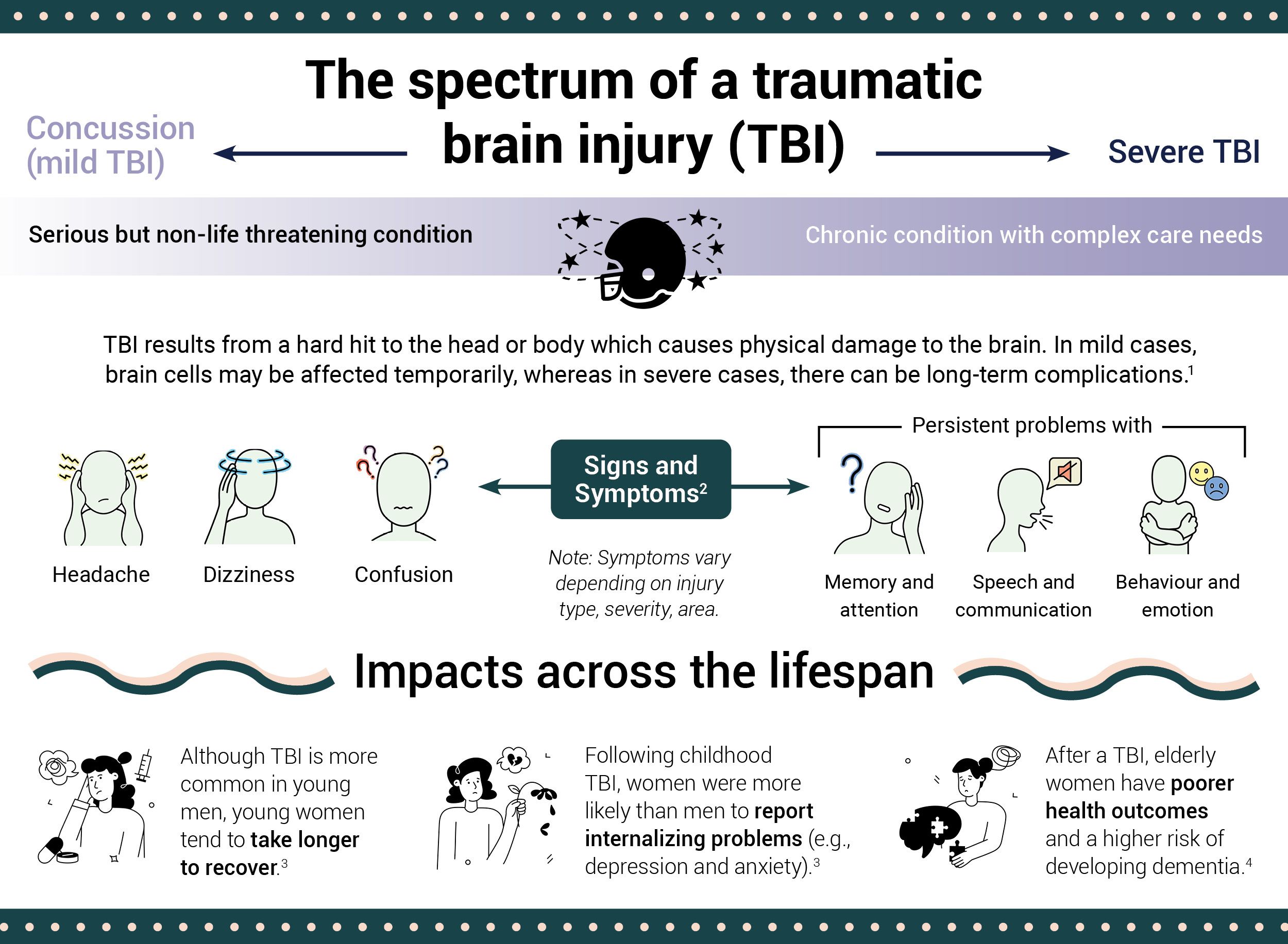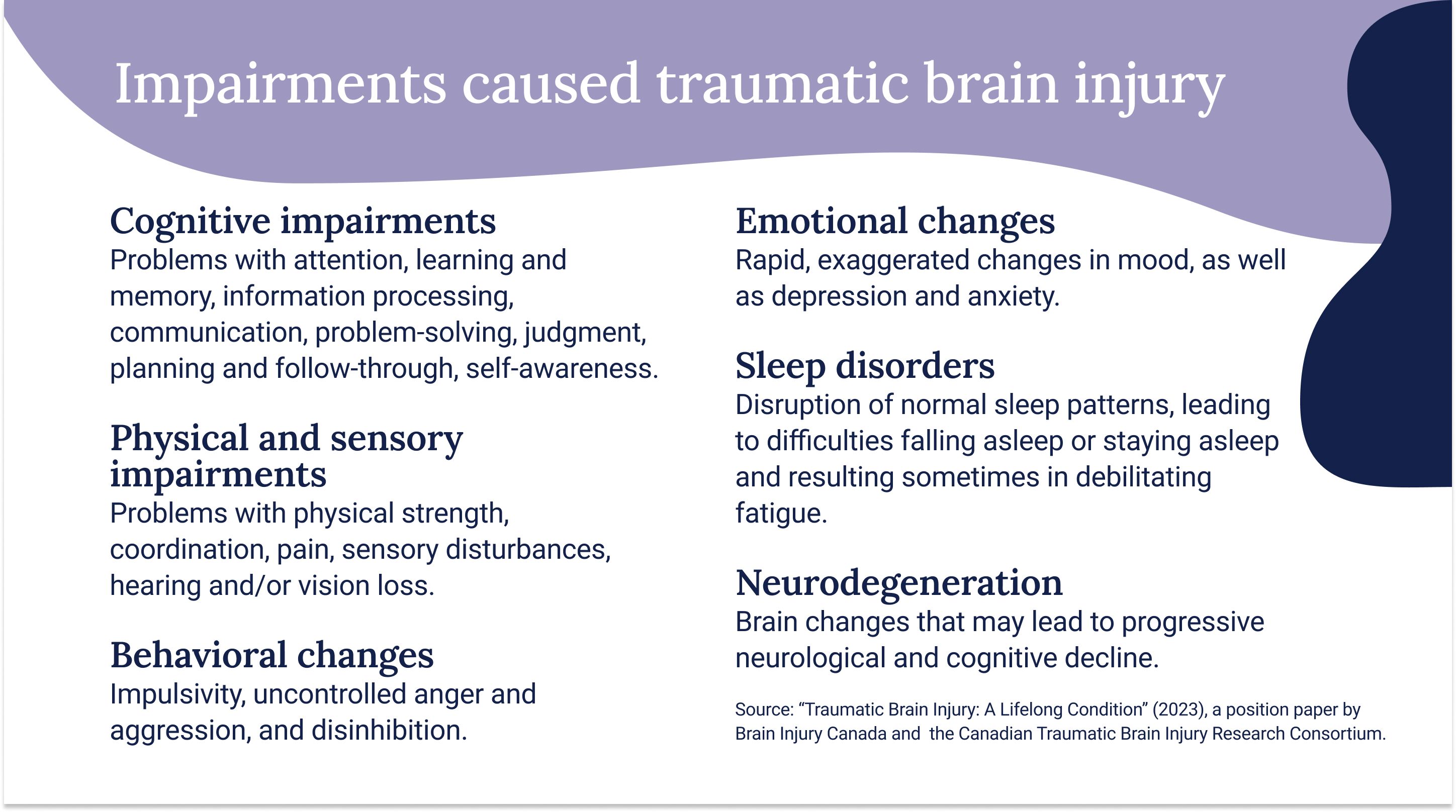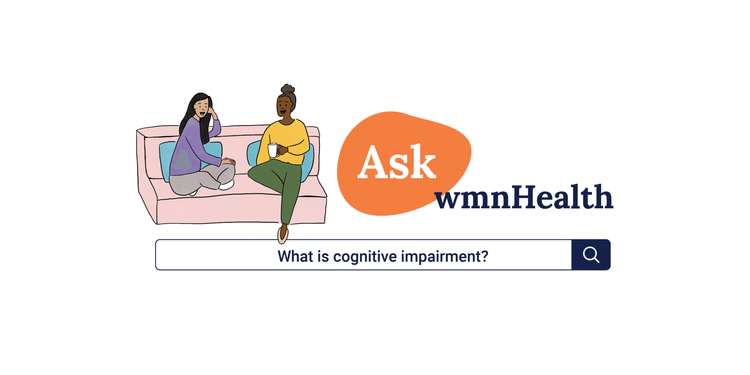
Aug 02, 2023, 4:00 am UTC
4 min
Created by
5 Things you should know about traumatic brain injury (TBI) in women
Traumatic Brain Injury (TBI) affects 50 million people worldwide yearly and is a significant cause of death and disability. In Canada, for example, TBI is the leading cause of death and disability in children, youth, and adults under 40.
While TBI affects more men than women, there is mounting evidence that TBI is much more common in women than previously believed. Research also suggests that TBI plays out differently in women compared with men:
- Women are more susceptible to concussions in contact sports.
- They report different and more persistent symptoms in the aftermath of brain trauma.
- They may take longer to recover.
Yet, TBI in women is grossly understudied.
What’s more, women face unique risks for brain injury. Globally, one in three women will experience violence at the hands of a partner, including blows to the face, head and neck, and strangulation. Research indicates that up to 92 percent of survivors experience brain injuries from these assaults. Yet, knowledge and awareness about brain injury due to intimate partner violence are low among healthcare providers.
Similarly, women and girls are rarely educated about brain injuries, including concussions, according to the brain injury advocacy group for women and girls, Pink Concussions.
“I believe females with brain injuries ARE the invisible patients within ‘the invisible injury,'” according to Katherine Snedaker, founder of Pink Concussions.
From the causes to the recovery process, understanding TBI in women is vital for effective care and support. This article covers the serious health consequences of TBI, plus five things you should know about TBI in women.
(Most research studies on TBI do not distinguish between differences related to biological sex versus differences related to gender. This article uses the terms "female" and "women" to reflect the current understanding of differences in TBI based on either biological sex or gender.)
What is Traumatic Brain Injury (TBI)?
Traumatic Brain Injury (TBI) refers to any damage to the brain caused by trauma, an external and forceful impact, that damages the brain tissue. A serious TBI occurs when a sudden physical impact to the head causes damage to the brain tissue encased in the skull. Concussions are a mild form of TBI.

What are the health consequences of TBI?
Concussions can cause a wide array of cognitive, behavioural, physical, and emotional symptoms (see list below), which usually resolve in a few weeks.
For people with more severe brain injuries, symptoms can persist throughout a lifetime, making it an urgent brain health issue. In fact, some experts, including Brain Injury Canada and the Canadian Traumatic Brain Injury Research Consortium, argue that moderate-to-severe TBI should be classified as a chronic condition given its long-term consequences.
“Brain injury is not an event or an outcome. It is the start of a misdiagnosed, misunderstood, under-funded neurological disease,” according to Carolyn Lemsky, neuropsychologist and clinical director, Community Head Injury Resource Services of Toronto.
Women who sustain brain injuries due to intimate partner violence face a host of challenges, including the risk of developing mental health and substance use conditions.
In addition to the impairments mentioned above, TBI can lead to degenerative processes in the brain that resemble those of disorders like Alzheimer’s disease, Parkinson’s disease, and multiple sclerosis.

5 things you should know about TBI in women
1. Female athletes are more susceptible to concussions than male athletes
Studies have shown that female athletes, especially in contact sports like soccer, basketball, ice hockey, and lacrosse, have an almost two times greater risk for a concussion than their male peers playing the same sports. Furthermore, the brain injuries they sustain may be more severe. Yet, most concussion protocols are based on data from men, further increasing the risk to women's brain health.
2. TBI can manifest differently in females compared to males
In the days and weeks after a concussion, females often report more severe and persistent symptoms, including problems with concentration, lightheadedness, fatigue, visual disturbances, and mood changes. Male concussions are more likely to be followed by amnesia. Females also report more symptoms overall. These sex-specific symptoms underscore the importance of personalized care to ensure accurate diagnosis and effective treatment.
3. TBI can cause temporary changes in sex hormones
Estrogen and progesterone are the predominant sex hormones in females and their levels vary across the lifespan. TBI can cause temporary changes in the levels of circulating sex hormones, which influence how the brain and body function. For example, numerous studies have shown that TBI can decrease progesterone levels in females and that low progesterone levels are associated with worse outcomes from brain injury. This suggests that progesterone may have a protective effect on the brain. Scientists are testing whether progesterone can be used as a therapy for brain injury, though results have been mixed.
4. Recovery may take longer for women than men
While research on TBI recovery in women and girls is still developing, some studies suggest that women may have better outcomes in certain cognitive and functional domains compared to men. However, they may experience more severe post-concussion symptoms and have prolonged recovery periods. This suggests that tailored rehabilitation programs may be needed to address women’s unique recovery needs.
5. Women with TBI face barriers to care
Women with TBI may face additional challenges in accessing appropriate healthcare. They are more likely to experience delays in diagnosis and may receive inadequate treatment due to implicit gender biases and outdated stereotypes. Raising awareness about these disparities is essential for promoting equitable access to quality healthcare for brain injury, regardless of a person’s gender.
Resources
For more information on brain injury, especially in women, see:
Brain Injury Canada and the Brain Injury Association of America - national charitable organizations for the brain injury communities in Canada and the USA.
Pink Concussions - a U.S.-based organization focused on female brain injury from sports, violence, and military service.
The SOAR Project - a Canadian not-for-profit initiative focused on research and education about brain injury and intimate partner violence.


